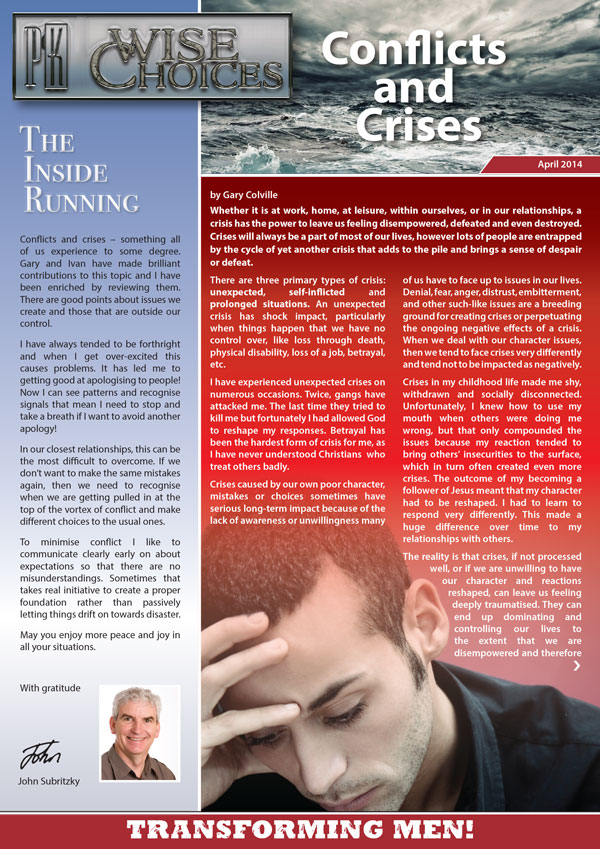Whether it is at work, home, at leisure, within ourselves, or in our relationships, a crisis has the power to leave us feeling disempowered, defeated and even destroyed. Crises will always be a part of most of our lives, however lots of people are entrapped by the cycle of yet another crisis that adds to the pile and brings a sense of despair or defeat.
There are three primary types of crisis: unexpected, self-inflicted and prolonged situations. An unexpected crisis has shock impact, particularly when things happen that we have no control over, like loss through death, physical disability, loss of a job, betrayal, etc.
I have experienced unexpected crises on numerous occasions. Twice, gangs have attacked me. The last time they tried to kill me but fortunately I had allowed God to reshape my responses. Betrayal has been the hardest form of crisis for me, as I have never understood Christians who treat others badly.
Crises caused by our own poor character, mistakes or choices sometimes have serious long-term impact because of the lack of awareness or unwillingness many of us have to face up to issues in our lives. Denial, fear, anger, distrust, embitterment, and other such-like issues are a breeding ground for creating crises or perpetuating the ongoing negative effects of a crisis. When we deal with our character issues, then we tend to face crises very differently and tend not to be impacted as negatively.
Crises in my childhood life made me shy, withdrawn and socially disconnected. Unfortunately, I knew how to use my mouth when others were doing me wrong, but that only compounded the issues because my reaction tended to bring others’ insecurities to the surface, which in turn often created even more crises. The outcome of my becoming a follower of Jesus meant that my character had to be reshaped. I had to learn to respond very differently. This made a huge difference over time to my relationships with others.
The reality is that crises, if not processed well, or if we are unwilling to have our character and reactions reshaped, can leave us feeling deeply traumatised. They can end up dominating and controlling our lives to the extent that we are disempowered and therefore unable to become the great person God intended us to be.
You see, understanding who we are in Christ and how to respond to crises is really the key to raising or lowering its impact on us.
I find sitting down and reflecting in writing or talking and praying with someone I trust is most helpful in dealing with a crisis.
Stop: Pressure is often the source of bad decisions.
Ask: Am I allowing crisis pressure to control my responses? In God’s vast eternal plan does this issue really matter?
In 99 percent of situations we may feel pressured because of some crisis. No matter how big a crisis may be to us, God is still all-powerful and “able to do immeasurably more than all we ask or imagine” (Eph 3:20), therefore I can trust Him in all situations and allow Him to reshape my responses.
Process: What is the best response I should make?
The Bible has the amazing ability to bring perspective in a way we don’t naturally lean towards. James says something that contradicts popular thinking on dealing with crises, “Consider it pure joy, my brothers, whenever you face trials of many kinds.” (James 1:2) It’s not about ignoring the crisis but about robbing crisis of its power to control our lives.
In verse 4, James develops the thinking around this idea of our need to persevere “so that you will become mature and complete”. In that context we can take the words of our Lord from Isaiah 41:10, “So do not fear, for I am with you; do not be dismayed, for I am your God. I will strengthen you and help you.”



